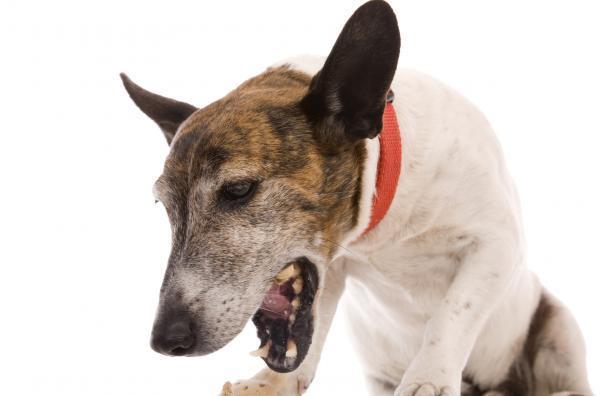Enteritis in Dogs - Causes, Symptoms and Treatment



See files for Dogs
Enteritis in dogs consists of an inflammation of the small intestine. Intestinal inflammation in dogs can appear as acute or chronic. The main symptom of enteritis in dogs is diarrhea, which can originate in either the small or large intestine.
Because canine enteritis causes diarrhea and vomiting, it can result in a dehydration which is extremely dangerous and can even be fatal. This is why, if your dog is suffering from enteritis, it CANNOT be ignored. For more about the symptoms, causes and treatment of enteritis in dogs, keep reading here at AnimalWised.
Enteritis in dogs symptoms: diarrhea
As we have already mentioned above, diarrhea is the most common symptom of intestinal problems in dogs. Diarrhea in dogs is when the feces are released in liquid from and are somewhat constant. This occurs because the food makes a rapid transit through the intestine and therefore, there is no time for the absorption of substances or water, which is why the stool reaches the rectum in a liquid state.
The most common causes of diarrhea in dogs are:
- Changes in diet.
- Consumption of irritants such as grass, trash, wood, plastic, etc.
- Food intolerance.
- Intestinal parasites.
- Drugs or medication that have diarrhea as a side effect, especially anti-inflammatories and antibiotics.
- Emotional situations such as fear or excitement.
As we have said, diarrhea can be acute, starting suddenly and ending in a short period of time, or chronic, which will persist for weeks or recur episodically. Acute canine enteritis can resolve spontaneously, but chronic enteritis in dogs requires veterinary assistance[1].
Difference between enteritis and gastroenteritis
Before we move on, it’s important not to confuse enteritis with gastroenteritis in dogs. Enteritis in dogs consists of an inflammation of the small intestine. Gastroenteritis, however, is an inflammation of both the stomach and intestine.

Enteritis in dogs: intestinal inflammation
When it comes to chronic enteritis in dogs, symptoms such as malabsorption, weight loss, anemia or malnutrition occur, in addition to diarrhea. These inflammatory diseases in dogs are treatable but hardly curable.
The intestines can suffer from different inflammatory cells, resulting in; enteritis or enterocolitis (small intestine and colon), which we will discuss in the following paragraphs. Endoscopes, biopsies or surgery are generally required when it comes to enteritis treatment, depending on the specific diagnosis.
For more we recommend reading my dog has diarrhea but is acting fine - what do I do?
Lymphocytic plasmocytic enteritis in dogs
Lymphocytic plasmocytic enteritis is the most common inflammatory bowel disease in dogs. Lymphocytic plasmocytic enteritis in dogs has been linked to Giardia or food allergies, although it is also true that there are some breeds which are more prone to this inflammatory bowel disease than others, like Shar Peis. For more, read about Giardia in dogs here.
In addition to diarrhea, lymphoplasmacytic enteritis symptoms also include vomiting. As for this enteritis treatment, some dogs can see an improvement or reduction in symptoms by changing to a hypoallergenic diet. Antibiotics and/or immunosuppressant drugs may also be prescribed by a veterinarian.
For more, we recommend reading our article where we discuss dog food allergies and intolerance - diet.

Eosinophilic enteritis in dogs
This type of inflammatory disease in dogs is rare. Eosinophils are cells from the immune system that rise up in situations of parasitosis or allergies. In this type of canine enteritis causes an elevation in blood, when can be seen through a performed analytical. This canine inflammatory disease is linked to food allergies or intestinal parasites. Eosinophilic enteritis treatment includes corticosteroids or a hypoallergenic diet.
Enteritis in dogs: Granulomatous
Granulomatous enteritis in dogs is considered a very rare dog disease, similar to Crohn's disease in humans. This diseases causes a thickening and narrowing at the end of the large intestine. Is your dogs feces bloody and mucus-y? A dog suffering from granulomatous enteritis will experience diarrhea with blood and mucus.
This enteritis treatment includes the administration of corticosteroids and immunosuppressive drugs, with the aim of reducing inflammation. In some cases, antibiotics may also be prescribed. Sometimes, if intestinal areas have become too narrowed, a veterinarian may suggest surgery[2].
For more, we recommend reading blood in dog feces - causes and diseases.
Enteritis in dogs: acute
Although we’ve already mentioned that acute enteritis can resolve itself spontaneously, sometimes, if the origin is infection, it will require veterinary attention.
Is your dog vomiting and has diarrhea? Diarrhea, vomiting blood, fever and/or apathy are all enteritis in dogs symptoms. Due to the loss of fluids that occur, the animal can become dehydrated. This is why if you’re dog is suffering from any of these above mentioned enteritis symptoms we recommend going to a veterinarian as soon as possible. This is especially important if the dog is an older dog or a puppy.
Among these causes of this enteritis is canine parvovirus, bacteria such as E. coli and poisoning. Treatment depends on the cause of the enteritis. In this case, fluid replacement is essential. For more, read our article where we discuss everything you need to know about canine parvovirus and homemade solutions for dehydrated dogs.

Enteritis in dogs: inflammatory disease in dogs
Inflammatory diseases in dogs are common and therefore, as a dog owner, you should know how to recognize the symptoms in order to treat the specific case accordingly. To help you, we recommend reading:
Enteritis in dogs: poisoning
One of the main causes of entiritis in dogs is food poisoning. Therefore, we recommend watching our video below where we discuss food dogs CAN’T eat.

This article is purely informative. AnimalWised does not have the authority to prescribe any veterinary treatment or create a diagnosis. We invite you to take your pet to the veterinarian if they are suffering from any condition or pain.
If you want to read similar articles to Enteritis in Dogs - Causes, Symptoms and Treatment, we recommend you visit our Intestinal problems category.









